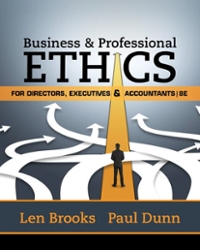Jrme Kerviel joined the French bank, Socit Gnrale (SocGen), in 2000 at the age of twenty-three as
Question:
Jérôme Kerviel joined the French bank, Société Générale (SocGen), in 2000 at the age of twenty-three as part of its systems personnel in its back office. In 2005, he became a junior derivatives trader with an annual limit of €20 million, which is just under U.S.\($30\) million. However, in November 2007, exchange officials questioned SocGen about why he had traded more than U.S.\($74\) billion worth of stockindex futures contracts. Kerviel was allowed to continue trading until mid-January 2008, when SocGen liquidated his trading positions and realized a loss of U.S.\($7.62\) billion
(€4.9 billion). How did this happen? Who should be blamed? Was he different than other rogue traders?
Société Générale began operations in France in 1864 and is one of the main European financial institutions. It is the sixth-largest French company and the thirdlargest bank in the Eurozone. By the mid-
2000s, it had developed a risk culture. In 2007, for example, trading-related activities represented 35% of the bank’s revenue, up from 29% in 2004. Traders were well rewarded, and it was not uncommon for them to briefly exceed trading limits.
Kerviel began working for the bank in its back office recording and reconciling trading activity. In 2005, he became a trader in the bank’s arbitrage department, trading European stock futures. He took unauthorized positions in equities and futures and used his knowledge of the bank’s control procedures to conceal his trading positions.
Because he knew the timing of the nightly reconciliation of daily trades, he was able to delete and reenter his trades or enter fictitious offsetting trades. Although the bank’s risk control department monitored the bank’s overall position, it did not verify individual transactions, so his trades went undetected.........
Questions:-
1. Did Jérôme Kerviel perpetrate a fraud?
Why or why not?
2. When such mammoth unauthorized trades occur and the bank is bankrupted or severely damaged financially, should the Board of Directors, who have the ultimate responsibility for the bank’s activities, or its executives, whose job it is to protect the bank, go to jail rather than the rogue trader?
3. Were the bank’s actions in liquidating Kerviel’s positions ethical?
4. Did the French officials who authorized the liquidation behave ethically?
5. There is considerable debate about whether better controls can ever stop a rogue trader. What is your opinion, and why?
6. If enhanced controls really cannot stop all rogue traders, how are companies to be protected from them?
Step by Step Answer:

Business And Professional Ethics
ISBN: 9781337514460
8th Edition
Authors: Leonard J Brooks, Paul Dunn





